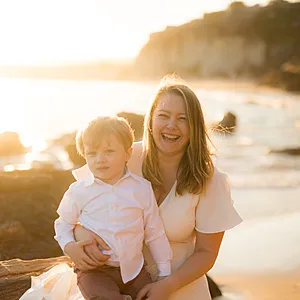Displaced Ukrainians desperate for safe homes on the Northern Beaches; our in-depth look at the fallout of the Russian invasion from a local perspective.
Ukrainian families displaced by war in their homeland have begun to arrive in Australia, with Manly Observer recently meeting some of the first families to have found haven on the Northern Beaches.
While grateful to be safe and far from the threat of Russian troops, there has been a lack of communication over the stability of their stay in Australia; finding temporary housing for those thousands offered a humanitarian visa also continues to pose a challenge.
Fairlight resident Emma Coultas has just welcomed a Ukrainian grandmother into her home. The Ukrainian woman will soon be joined by her husband and their twin grandchildren. She has settled in well during the last week, Emma reports, but she is still too afraid to leave the house and is rattled by the sound of planes or helicopters overhead.

Emma registered as a host via the main Australian/Ukrainian connection portal https://ukrainians.org.au. She was quickly offered one family but was then bombarded with desperate accommodation requests from many more.
“Some of these refugees have family members or friends in Australia, but most don’t, and as such urgently need accommodation upon arrival,” Emma said.
Emma, who partly grew up in Russia and speaks the language (as do most Ukrainians), has received half a dozen requests for accommodation but has no more room with her own children, aged 5 and 7, to look after.

“The humanitarian agencies are so busy they are connecting people needing homes to volunteers directly, so I am still receiving the requests. It feels horrible to say no.
“While it’s a temporary accommodation it’s still a big undertaking because you just don’t know how long they are going to need to be with you. The visas are valid for three years, and people like the family I am hosting don’t have any family and will need a lot of support.
“I just think we need to be prepared that it is pretty open ended, and the government hasn’t as yet given any kind of plan for providing long term accommodation or for how these people are meant to be settled into Australia if the war goes on.” That said, Emma asserts it was a ‘no brainer’ to accept a family.
“It was a snap decision but how could we not when we have the space?”
Can Northern Beaches Council help?
We asked Northern Beaches Mayor Michael Regan if some accommodation could be provided, but he said the area was already stretched to its limit.
“We have no housing,” he replied. “There is a shortage of social and affordable housing locally for around 8,000 plus local residents and severe shortage for crisis accommodation for domestic violence victims and homeless youth.
“So it’s of no surprise, sadly, that these refugees will struggle to find local accommodation. It’s great we have some local families volunteering to help these families from Ukraine, who, through no fault of their own, find themselves homeless and in the middle of a war not of their making.
“Hopefully our Federal government and State government can work together to help find them homes,” he added. “But it again highlights the issue of affordable housing and the desperate need to do more, even locally.”
You can offer to host a family here: https://ukrainians.org.au/i-would-like-to-help/
Visa uncertainty remains an issue
Prime Minister Scott Morrison announced last month that Australia will be providing temporary humanitarian visas for Ukrainians escaping war. Those arriving after the announcement on 20 March 2022 are expected to be processed shortly, and issued with a visa valid for three years that allows people to work, study and access Medicare. This is in addition to support facilitated by Australia’s experienced Humanitarian Settlement Program providers.
Allowing Ukrainians to enter Australia and transfer to three-year Temporary Humanitarian Concern (subclass 786) visas gives people hope and options, confirmed the Refugee Council of Australia. “The visa enables Ukrainians temporarily in Australia to work or study and access Medicare while they wait to see what the future holds.”

Current information available for new arrivals states that all Ukrainian nationals who were already in Australia on 23 February 2022, and who held a temporary visa that ceased before 30 June 2022, have been provided with an automatic six-month extension to their stay period. But they still cannot work.
The current challenge for refugees arriving before the announcement of humanitarian visas has been a lack of certainty over whether their visitor visa will be converted to a humanitarian one. It falls in between the current announcements. Without a conversion, they remain unable to work and support themselves while in Australia.
For Yana Zakharchuk and the 12 other displaced Ukrainians she is sharing a home with on the Northern Beaches, an inability to work remains a large concern. They happen to fit in the in-between period, not in the country in February, but arriving before the 20 March announcement. As yet, they had been unable to get any information from the Australian government about what happens next.
However, Manly Observer received confirmation on Wednesday from the Department of Home Affairs that Immigration Minister Alex Hawke had given an undertaking that “The Australian Government will make available a temporary humanitarian (subclass 786) visa to all Ukrainian temporary visa holders currently in Australia and those who arrive in the coming months.”
A Departmental spokesperson said the they had now granted over 6,000 mostly temporary visas in Ukraine with 1,600 having arrived by this week.
We have connected Yana and the others with Community Northern Beaches, who will be working to assist them navigate the visa challenges. We also connected recent arrivals with Mackellar MP Jason Falinski and Warringah MP Zali Steggall, both of whom have showed a willingness to assist.
For now, it’s a waiting game. And perhaps too much time to reflect.
Painful reflections
“On the day the war came it was meant to be the happiest day,” Yana told Manly Observer. “I own and run an English school in the western part of Ukraine, and we were finally returning to normal after closure from COVID. I had just hired new teachers and the future was looking bright.

“This year was meant to be like the best ever in Ukraine in the recent three years, because we were a bit out of caring about COVID so much. My husband’s mother (my mother-in-law), owns a wedding dress manufacturing business and we were expecting so many happy weddings this year, because those restrictions were finally easing for the business.
“When my husband called to say the war was here, I didn’t believe him at first. Then I saw the petrol lines, and traffic jams… then there were beds in schools, kindergartens. So many hiding and there are these sirens that go when there are dangers…
“The bomb shelters are just dirty and not ready for people as they are from World War 2; we didn’t think it would happen again and so were not ready. And there are little children dirty and hiding in there. The parents are so worried. It is so bad.”
What followed is now a well-worn story of Russian invasion under the claim of saving Ukraine from apparent ‘fascism’, and corresponding with Russia’s perceived threat of the West.
Meeting the families
I was invited into the home of long-time Australians (albeit Ukraine-born) couple George and Taiga (“Tracy”) Gorda last week. They are the ones hosting Yana and four families in their Frenchs Forest home – a dozen people including babies and children – all relatives in some form.
Yana made me a pot of tea and popped down some biscuits on the table. After a few minutes of talking, I was joined by the hosts and eventually everyone in the house sat across from me to watch, including a very large and important looking cat called Boris.
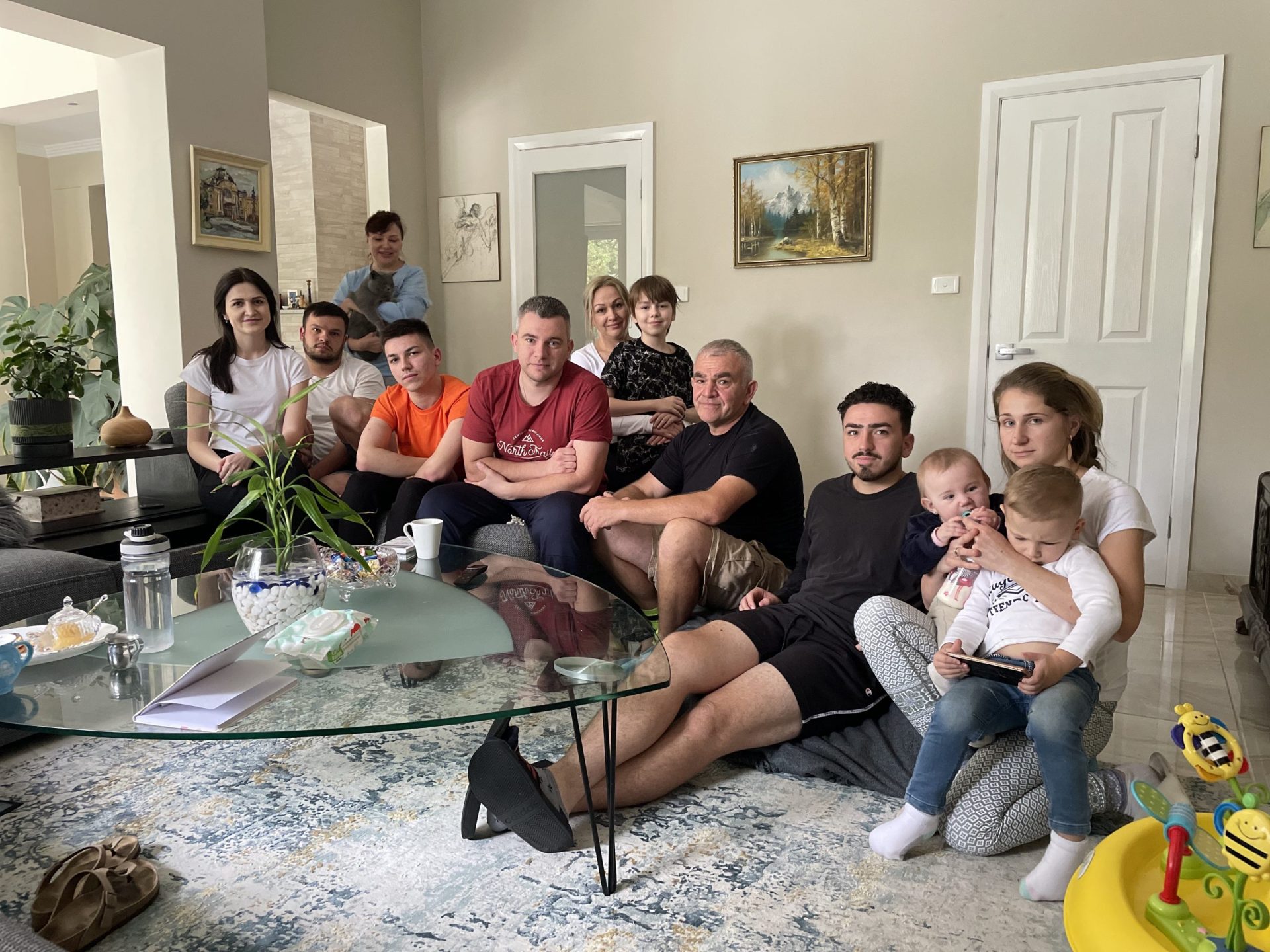
George and Tracy have four of their own children, all adults but two still at home, with son William (far right in black) tasked with organising visas and helping the dozen guests with urgent visitor visas to come to Australia.
Yana translated on behalf of those who do not speak English. “People I think wonder why we came here instead of somewhere in Europe, but we don’t have anyone else to go to in Europe. Here we have an uncle (George). And there are so many refugees already in Eastern Europe.
“Our town is in the west, near the Romanian border, and so many people have come there fleeing from some of the places hardest hit already like Mariupol. Our town went from a population of 250,000 to a million. There is no shelter; there is no food on the shelves.”
“My English school…” Yana began but trailed off. She began crying and I’m not far behind her.
Host Tracy showed me footage from Mariupol, in the southeast. Mariupol was invaded in late February, with more than 5,000 killed.
There are dead bodies in blankets piled along the corridors; someone opens a blanket to reveal a dead infant. I think the umbilical cord is still attached. I lowered my tea and we all sat in silence.
She held the phone under my nose and together we watched film footage of someone walking through a hospital. It appears to have been bombed but I didn’t ask for a translation. There are dead bodies in blankets piled along the corridors; someone opens a blanket to reveal a dead infant. I think the umbilical cord is still attached. I lowered my tea and we all sat in silence.
While I do not have any verification and context for the footage, and others I am shown, I’ve read enough on the conflict to know it is a plausible account. Those arriving from Ukraine, whether from the cities already invaded, or those towns further west waiting for ‘the inevitable’, bring significant traumas.
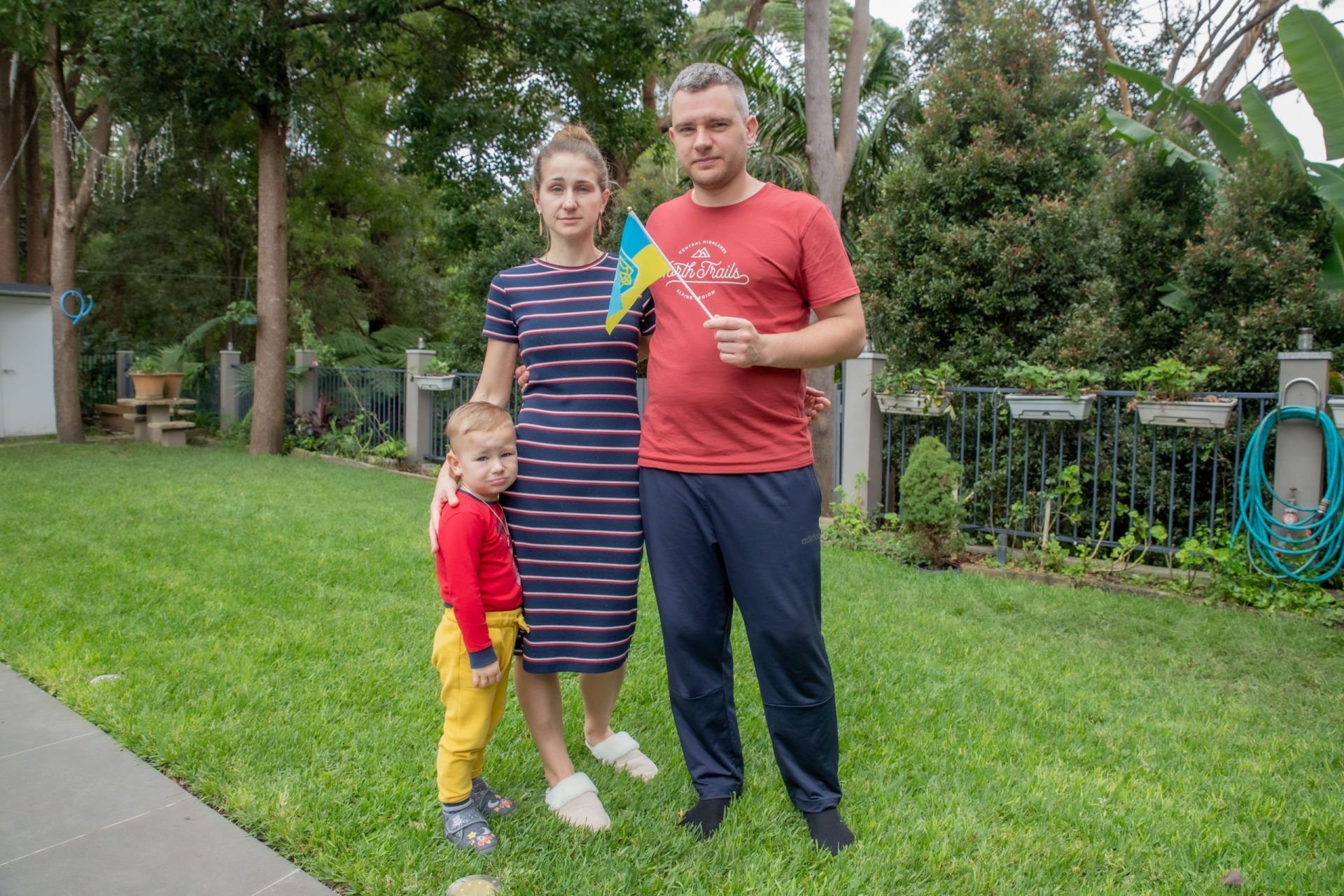
“I still hope that maybe it stops soon,” Yana despaired. “I still have hope, I am still paying rent for my English school. Maybe it’s impossible, but I hope that it ends…”
Sat quietly across from me was 18-year-old Daniel – coincidentally, my son’s name. Daniel and many of the other men in the room were able to leave, just a few hours before those over 18 were forced to stay and fight.
“Some of my friends, also 18, they are fighting,” Daniel revealed. “They are handed a gun and given maybe half an hour to show them how to use it.”
Host George intercepted, “It’s very different from when I had to fight in Ukraine under Soviet rule, then everybody received training.”
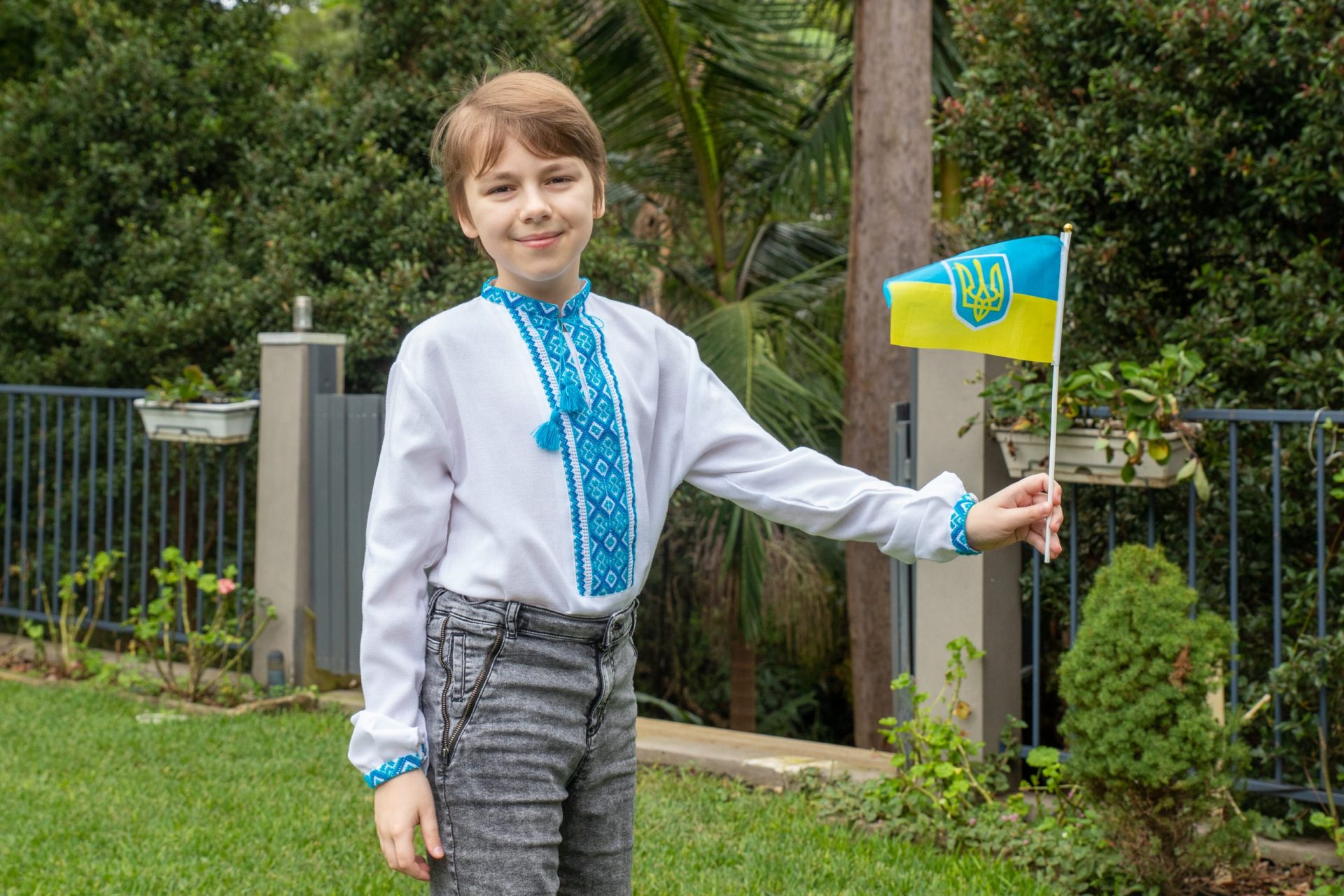
How did they all escape?
Here we cannot assign quotes to one particular family member, they all finished each other’s sentences:
“We had help to gather money for flights. George of course helped some of us to get here. We crossed the border in Romania. Some took a train, others took a car.
“We had to leave our car by the side of the road. So many people just left their cars and started to walk – at the border there are a couple of kilometres of cars abandoned.
“Then we joined the other refugees lining up for visas, for processing. It was expensive but we managed to get flights to Australia.”
And now they are here. Overwhelmed, uncertain of what comes next, traumatised. But safe.
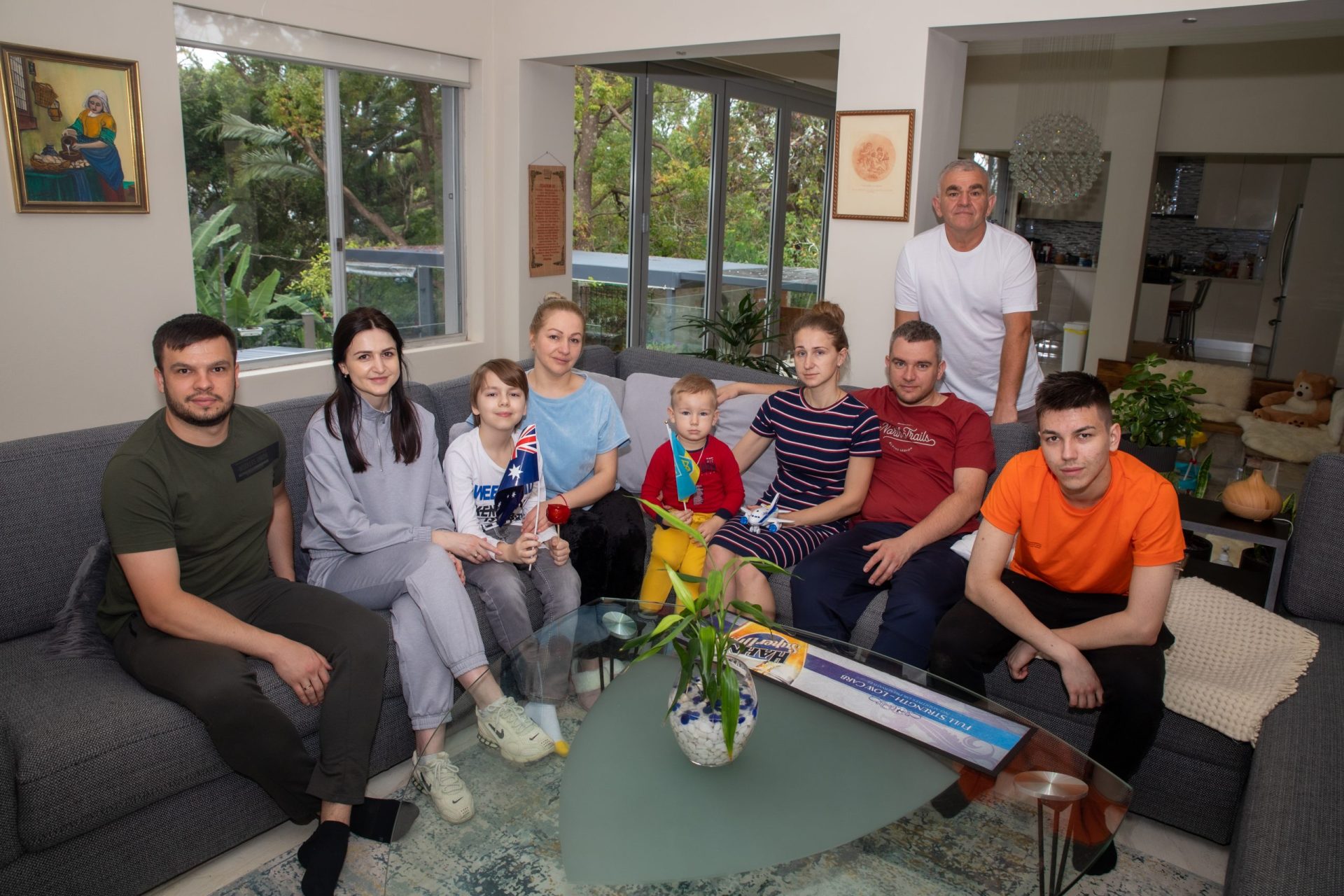
I am invited to join them around the table and eat some Ukrainian food. It’s vegetables and rice wrapped in cabbage and bloody delicious, whatever it is!
With the help of hundreds of Northern Beaches locals, I brought a large shop of essentials – groceries, toilet paper etc – with me before the interview. But there are many in the Frenchs Forest home and I realised it won’t last long.
So, I called the head of One Meal Northern Beaches, Kim Williams, and asked if they could help set up something permanent, since so far there is no communication from the Australian government about available support.
Technically the Ukrainians are still registered as visitors, not refugees after all.
Within a minute Kim arranged a regular supply of groceries to the family, like his charity does for many others in our community.
Yana was very grateful. “We are so thankful Australians have given us this help. It is really appreciated,” she said.
I explained how I put a call out for help from locals and received an overwhelming response, plus offers of local café vouchers, and various extensions of support.
“We can’t do much about the bigger issue,” I sympathised, “about war in your homeland, I don’t think, but we can do whatever we can to help you while you are here.
“We’ve got your back.”

USEFUL INFORMATION FOR DISPLACED UKRAINIANS
- The Department has published a Ukraine visa support page on the Home Affairs website: Ukraine visa support (homeaffairs.gov.au) to receive inquiries directly from clients and assist the Ukrainian community in Australia to consider visa options for family members.
Visa and Settlement support in Australia
- Ukrainian nationals who have arrived on a temporary visa, and wish to extend their stay in Australia, can seek information about visa options via this online enquiry form.
- On 20 March 2022, the Prime Minister and the Minister for Immigration, Citizenship, Migrant Services and Multicultural Affairs, the Hon Alex Hawke MP, announced that the Government will make available a temporary humanitarian visa to Ukrainians forced to flee from Russia’s military invasion, and who have arrived in Australia.
o This visa will be valid for three years and allow people to work, study and access Medicare.
- The Department will provide further advice to support the transition of eligible and interested Ukrainians onto a Temporary (Humanitarian Concern) visa in “due course.”



